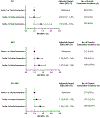High-Sensitivity Troponin T, NT-proBNP, and Cognitive Outcomes in SPRINT
- PMID: 38957975
- PMCID: PMC11842154
- DOI: 10.1161/HYPERTENSIONAHA.124.22876
High-Sensitivity Troponin T, NT-proBNP, and Cognitive Outcomes in SPRINT
Abstract
Background: Hs-cTnT (cardiac troponin T measured with a highly sensitive assay) and NT-proBNP (N-terminal pro-B-type natriuretic peptide) may identify adults with hypertension who derive greater cognitive benefits from lower systolic blood pressure targets.
Methods: In the SPRINT (Systolic Blood Pressure Intervention Trial) MIND study, participants were categorized as having both hs-cTnT and NT-proBNP in the lower 2 tertiles (n=4226), one in the highest tertile (n=2379), and both in the highest tertile (n=1506). We assessed the effect of intensive versus standard treatment on the composite of mild cognitive impairment (MCI) or probable dementia (PD) across biomarker categories.
Results: Over a median follow-up of 5.1 years, 830 of 8111 participants (10.2%) developed MCI or PD. Participants in the highest biomarker category were at higher risk of MCI or PD compared with those in the lowest category (hazard ratio, 1.34 [95% CI, 1.00-1.56]). The effect of intensive treatment on reducing the risk of MCI or PD was greater among participants in the lowest biomarker category (hazard ratio, 0.64 [95% CI, 0.50-0.81]) than those in the intermediate (hazard ratio, 1.01 [95% CI, 0.80-1.28]) or highest categories (hazard ratio, 0.90 [95% CI, 0.72-1.13]; Pinteraction=0.02). The 5-year absolute risk differences in MCI or PD with intensive treatment were -2.9% (-4.4%, -1.3%), -0.2% (-3.0%, 2.6%), and -1.9% (-6.2%, 2.4%) in the lowest, intermediate, and highest biomarker categories, respectively.
Conclusions: In SPRINT, the relative effect of intensive systolic blood pressure lowering on preventing cognitive impairment appears to be stronger among participants with lower compared with higher cardiac biomarker levels, though the absolute risk reductions were similar.
Keywords: biomarkers; cognition; dementia; hypertension; natriuretic peptides; troponin T.
Conflict of interest statement
J.A. de Lemos reports grant support from Roche Diagnostics and Abbott Diagnostics, consulting fees from Ortho Clinical Diagnostics, Quidel Cardiovascular Inc, and Siemen’s Health Care Diagnostics. He has been named a co-owner on a patent awarded to the University of Maryland (US Patent Application Number: 15/309,754) entitled: “Methods for Assessing Differential Risk for Developing Heart Failure.” C.M. Ballantyne reports consulting and research support from Abbott and Roche Diagnostics. J.D. Berry reports grant support from the National Institutes of Health, Roche Diagnostics, and Abbott Diagnostics, consulting fees from Roche Diagnostics, and the Cooper Institute. The other authors report no conflicts.
Figures


References
-
- Mulligan MD, Murphy R, Reddin C, Judge C, Ferguson J, Alvarez-Iglesias A, McGrath ER, O’Donnell MJ. Population attributable fraction of hypertension for dementia: global, regional, and national estimates for 186 countries. eClinicalMedicine [Internet]. 2023. [cited 2023 May 30];60. Available from: https://www.thelancet.com/journals/eclinm/article/PIIS2589-5370(23)00189... - PMC - PubMed
-
- SPRINT MIND Investigators for the SPRINT Research Group, Williamson JD, Pajewski NM, Auchus AP, Bryan RN, Chelune G, Cheung AK, Cleveland ML, Coker LH, Crowe MG, et al. Effect of Intensive vs Standard Blood Pressure Control on Probable Dementia: A Randomized Clinical Trial. JAMA. 2019;321:553–561. - PMC - PubMed
Publication types
MeSH terms
Substances
Grants and funding
- UL1 TR000433/TR/NCATS NIH HHS/United States
- UL1 TR000445/TR/NCATS NIH HHS/United States
- UL1 TR000064/TR/NCATS NIH HHS/United States
- UL1 TR000075/TR/NCATS NIH HHS/United States
- UL1 TR001860/TR/NCATS NIH HHS/United States
- UL1 TR000003/TR/NCATS NIH HHS/United States
- UL1 TR000050/TR/NCATS NIH HHS/United States
- UL1 TR001420/TR/NCATS NIH HHS/United States
- UL1 RR025755/RR/NCRR NIH HHS/United States
- UL1 RR024134/RR/NCRR NIH HHS/United States
- HHSN268200900048C/HL/NHLBI NIH HHS/United States
- UL1 TR000005/TR/NCATS NIH HHS/United States
- HHSN268200900040C/HL/NHLBI NIH HHS/United States
- HHSN268200900046C/HL/NHLBI NIH HHS/United States
- P30 GM103337/GM/NIGMS NIH HHS/United States
- UL1 TR001064/TR/NCATS NIH HHS/United States
- UL1 RR025752/RR/NCRR NIH HHS/United States
- UL1 RR025771/RR/NCRR NIH HHS/United States
- R01 HL144112/HL/NHLBI NIH HHS/United States
- UL1 TR000093/TR/NCATS NIH HHS/United States
- HHSN268200900049C/HL/NHLBI NIH HHS/United States
- HHSN268200900047C/HL/NHLBI NIH HHS/United States
- UL1 TR000439/TR/NCATS NIH HHS/United States
- UL1 TR000073/TR/NCATS NIH HHS/United States
- UL1 TR000002/TR/NCATS NIH HHS/United States
- UL1 TR000105/TR/NCATS NIH HHS/United States
- KL2 TR001859/TR/NCATS NIH HHS/United States
- R01 AG055606/AG/NIA NIH HHS/United States
LinkOut - more resources
Full Text Sources
Medical
Research Materials

